|
1. "Aghast" at Bush's Picks for Medals of Freedom, "Hush Medals"?
The awarding Tuesday of Presidential Medals of Freedom to Tommy Franks, Paul "Jerry" Bremer and George Tenet upset reporters on ABC and MSNBC. ABC's Peter Jennings teased World News Tonight by announcing that President Bush decided to honor "three men whose contribution to the war was controversial." Reporter John Cochran cited Bremer's "decision to remove Iraqis who served in Saddam Hussein's government" and how "that decision was reversed after the U.S. realized it needed their help." Cochran snidely noted: "No mention of that today." Cochran moved on to the "most controversial of the honorees," Tenet, who had insisted "the case for weapons of mass destruction in Iraq was 'a slam dunk.' Today, no mention of that, either." MSNBC's Chris Matthews declared: "I was aghast watching that medal of honor ceremony today." When Washington Post reporter Dana Priest explained Bush's reasoning, Matthews fired back: "Wait a minute. They're giving a medal for getting us into war under false pretenses?" At Keith Olbermann's prompting on Countdown, USA Today reporter Tom Squitieri contended that the awards are "being dubbed by some as 'hush medals.'"
2. NBC Focuses on Attacks on Rumsfeld, Raise Comparison to McNamara
A night after the NBC Nightly News highlighted John McCain's criticism of Donald Rumsfeld, the newscast on Tuesday evening devoted two full segments to the attacks on him on and Wednesday's Today led with how Rumsfeld is "on the
defensive." Jim Miklaszewski hyped how "the highly-decorated Vietnam POW Senator John McCain fired a broadside" at Rumsfeld. Setting up a clip from Senator Chuck Hagel, Miklaszewski stressed that "McCain's not the only Republican to publicly hammer Rumsfeld." Miklaszewski resurrected Vietnam as he relayed that "some of the military's top brass compare Rumsfeld to Defense Secretary Robert McNamara, who was accused of micro-managing the Vietnam War." Without mentioning how a reporter planted it, Tim Russert suggested that "the question asked by the young officer in Kuwait last week was the real catalyst" for the attacks on Rumsfeld. Russert highlighted new poll numbers which found "only about a third of the American people have a favorable opinion" of Rumsfeld." He told Williams: "Those are extremely high negatives for a Cabinet secretary."
 "Aghast" at Bush's Picks for Medals of "Aghast" at Bush's Picks for Medals of
Freedom, "Hush Medals"?
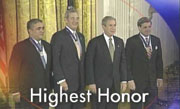 The awarding Tuesday of Presidential Medals of Freedom to Tommy Franks, Paul "Jerry" Bremer and George Tenet upset reporters on ABC and MSNBC. ABC's Peter Jennings teased World News Tonight by announcing that President Bush decided to honor "three men whose contribution to the war was controversial." Reporter John Cochran cited Bremer's "decision to remove Iraqis who served in Saddam Hussein's government" and how "that decision was reversed after the U.S. realized it needed their help." Cochran snidely noted: "No mention of that today." Cochran moved on to the "most controversial of the honorees," Tenet, who was "quoted as telling the President the case for weapons of mass destruction in Iraq was 'a slam dunk.' Today, no mention of that, either."
The awarding Tuesday of Presidential Medals of Freedom to Tommy Franks, Paul "Jerry" Bremer and George Tenet upset reporters on ABC and MSNBC. ABC's Peter Jennings teased World News Tonight by announcing that President Bush decided to honor "three men whose contribution to the war was controversial." Reporter John Cochran cited Bremer's "decision to remove Iraqis who served in Saddam Hussein's government" and how "that decision was reversed after the U.S. realized it needed their help." Cochran snidely noted: "No mention of that today." Cochran moved on to the "most controversial of the honorees," Tenet, who was "quoted as telling the President the case for weapons of mass destruction in Iraq was 'a slam dunk.' Today, no mention of that, either."
"I was aghast watching that medal of honor ceremony today," MSNBC's Chris Matthews declared on Tuesday's Hardball. When Washington Post reporter Dana Priest explained Bush's reasoning, Matthews fired back: "Wait a minute. They're giving a medal for getting us into war under false pretenses?" He denounced the "sales pitch" Tenet's CIA "cooked up for Colin Powell to deliver at the UN. It was all a pack of lies." Matthews demanded: "Okay, if you give the Medal of Freedom to the guy who's completely wrong in doing his job, what do you give to a guy who is completely right?"
(At the ceremony, President Bush praised Tenet for his performance in areas beyond Iraq: "Early in his tenure as DCI, George Tenet was one of the first to recognize and address the growing threat to America from radical terrorist networks. Immediately after the attacks of September the 11th, George was ready with a plan to strike back at al Qaeda and to topple the Taliban. CIA officers were on the ground in Afghanistan within days. Seasoned American intelligence officers, armed with laptop computers, Afghan clothes and a visionary plan, rode horseback with the fighters of the Northern Alliance, identified key targets for our military and helped to free a nation." For the text of Bush's remarks at the 11:30am EST Tuesday ceremony, as posted by the White House: www.whitehouse.gov )
In the hour after Hardball, on MSNBC's Countdown, at Keith Olbermann's prompting, USA Today reporter Tom Squitieri contended that the awards are "being dubbed by some as 'hush medals.' You know, these guys still have to write their memoirs and their take on what happened in Iraq, in particular, and when you get a medal from the President, it makes you a little bit nicer about what you may or may not want to write."
-- ABC's World News Tonight. Over a shot of the three men with medals around their necks, as they stood with President Bush, Peter Jennings teased his December 14 broadcast: "The President gives three Medals of Freedom today to three men whose contribution to the war was controversial."
Jennings set up the subsequent story: "At the White House today, President Bush gave the Presidential Medal of Freedom to three men deeply connected to his policy in Iraq. The former CIA director, George Tenet, oversaw the intelligence Mr. Bush used to justify the war, General Tommy Franks commanded U.S. troops for the invasion, and Paul Bremer was in charge of the occupation afterwards. Here's ABC's John Cochran."
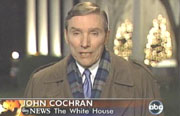 The audio was cut off at the start of Cochran's piece, which the MRC's Brad Wilmouth corrected against the closed-captioning:
The audio was cut off at the start of Cochran's piece, which the MRC's Brad Wilmouth corrected against the closed-captioning:
"-be with him in the history books. General Tommy Franks commanded forces in Afghanistan and Iraq."
George W. Bush: "One of the highest distinctions of history is to be called a liberator. And Tommy Franks will always carry that title."
Cochran ran through the honorees, adding a caveat for each: "Franks is generally given credit for a brilliant military campaign in Iraq. But after the main combat ended, American forces were hard-pressed to control insurgent violence. Franks thought he had enough troops. We now know that Paul Bremer, who was also honored today, disagreed. Bremer was the civilian administrator in Iraq. This fall, the White House was stunned when Bremer said there were not enough troops to keep the peace after the war. It was Bremer who made the decision to remove Iraqis who served in Saddam Hussein's government. That decision was reversed after the U.S. realized it needed their help. No mention of that today."
Bush: "Iraq is free today, and you helped make it so."
Cochran: "Perhaps most controversial of the honorees, former CIA Director George Tenet. After the 9/11 attacks, Democrats and Republicans criticized him. Tenet was also quoted as telling the President [picture on screen of Woodward's book] the case for weapons of mass destruction in Iraq was 'a slam dunk.' Today, no mention of that, either. The White House said there are times to rehash possible mistakes. But there are also times to pay tribute. John Cochran, ABC News, the White House."
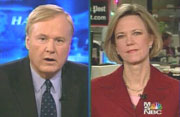 -- MSNBC's Hardball. Toward the end of a segment with Dana Priest, who appeared from the Washington Post newsroom, in the second half of the December 14 program, Chris Matthews blurted out: "I have to tell you, I'm waiting for a good response, Dana. I was aghast watching that medal of honor ceremony today. George Tenet, Bremer, Tommy Franks, it looked like the President was pinning a medal on the Iraq war, on himself -- for having fought the war. Why did these three guys deserve the medal of honor and why are they so obviously emblematic of the war, including the bad intel beforehand, the bad early work after the invasion itself that set itself for all the hell later. Tommy Franks, fine, he's a hero, he's a military guy. But what is this picture say to you of these three guys?"
-- MSNBC's Hardball. Toward the end of a segment with Dana Priest, who appeared from the Washington Post newsroom, in the second half of the December 14 program, Chris Matthews blurted out: "I have to tell you, I'm waiting for a good response, Dana. I was aghast watching that medal of honor ceremony today. George Tenet, Bremer, Tommy Franks, it looked like the President was pinning a medal on the Iraq war, on himself -- for having fought the war. Why did these three guys deserve the medal of honor and why are they so obviously emblematic of the war, including the bad intel beforehand, the bad early work after the invasion itself that set itself for all the hell later. Tommy Franks, fine, he's a hero, he's a military guy. But what is this picture say to you of these three guys?"
Dana Priest: "Well, it says just about the opposite of what you just said. It says the President still very much believes in the Iraq war and is very thankful and grateful for the work that the CIA performed in that war, regardless of whether they and the European allies and the Clinton administration's CIA all got that intelligence wrong."
Matthews, yelling over Priest: "Wait a minute. They're giving a medal for getting us into war under false pretenses? You give a guy the Medal of Freedom for that? That medal used to go to spies who risked their lives behind the scenes!"
Priest: "He did not give the Medal of Freedom to George Tenet because he miscalculated the WMD report. He gave it to him for the work that the CIA did inside Iraq, and before the war, and also for the war in Afghanistan."
Matthews sarcastically retorted: "You mean the sales pitch they cooked up for Colin Powell to deliver at the UN? It was all a pack of lies."
Priest: "No, they didn't cook up the sales pitch. They were wrong about the facts. But there's no indication that they knew that they were wrong and then they put it out there. There's a big difference."
Matthews: "Okay, if you give the Medal of Freedom to the guy who's completely wrong in doing his job, what do you give to a guy who is completely right?"
Priest: "I don't think he was completely wrong. He was wrong about the analysis on WMD. But you can't say the work they did inside Iraq or they work they did in Afghanistan was wrong. In fact, it netted all the al-qaeda leaders that we have in custody now. That's the CIA, the same CIA."
-- MSNBC's Countdown. Keith Olbermann plugged an upcoming segment: "The CIA got blamed for some ill-chosen words in a State of the Union Address, you may recall, yet the former CIA director was one of three men to get the nation's highest civilian honor today. Sounds like there might be more to that story. And there is. Stand by."
Olbermann soon opined: "Tenet, of course, became the fall guy for the WMD fiascos and a target of the 9/11 Commission. Bremer surprised the administration by suggesting at one point the U.S. did not have enough troops in Iraq to keep the peace. Even General Franks said the makeup of those forces that were there did not match the needs of the occupation. So why the trophies? I'm delighted to be joined by Tom Squitieri, USA Today's Pentagon reporter."
Olbermann asked: "Let me start with Bremer and Tenet. Are these consolation prizes? Are they home versions of the Iraq War game? What are they?"
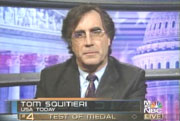 USA Today reporter Tom Squitieri argued: "Well, even in this cynical time, the level of cynicism of this one is reaching new proportions. It's being dubbed by some as 'hush medals.' You know, these guys still have to write their memoirs and their take on what happened in Iraq, in particular, and when you get a medal from the President, it makes you a little bit nicer about what you may or may not want to write. This medal helps to validate their time in Iraq and validates the White House decision to have those people in charge of the war in Iraq in the aftermath of the invasion. And so the coverage tomorrow, I think, will reflect that."
USA Today reporter Tom Squitieri argued: "Well, even in this cynical time, the level of cynicism of this one is reaching new proportions. It's being dubbed by some as 'hush medals.' You know, these guys still have to write their memoirs and their take on what happened in Iraq, in particular, and when you get a medal from the President, it makes you a little bit nicer about what you may or may not want to write. This medal helps to validate their time in Iraq and validates the White House decision to have those people in charge of the war in Iraq in the aftermath of the invasion. And so the coverage tomorrow, I think, will reflect that."
Squitieri did not write USA Today's Wednesday story on the medal picks.
  NBC Focuses on Attacks on Rumsfeld, Raise NBC Focuses on Attacks on Rumsfeld, Raise
Comparison to McNamara
A night after the NBC Nightly News highlighted John McCain's criticism of Donald Rumsfeld, the newscast on Tuesday evening devoted two full segments to the attacks on him on and Wednesday's Today led with how Rumsfeld is "on the
defensive." Anchor Brian Williams dubbed Rumsfeld the "most controversial" Defense Secretary "in decades." Jim Miklaszewski hyped how "the highly-decorated Vietnam POW Senator John McCain fired a broadside" at Rumsfeld. Setting up a clip from Senator Chuck Hagel, Miklaszewski stressed that "McCain's not the only Republican to publicly hammer Rumsfeld." Miklaszewski resurrected Vietnam as he relayed that "some of the military's top brass compare Rumsfeld to Defense Secretary Robert McNamara, who was accused of micro-managing the Vietnam War."
Without mentioning how a reporter planted it, Tim Russert suggested that "the question asked by the young officer in Kuwait last week was the real catalyst" for the attacks on Rumsfeld. Russert highlighted new poll numbers which found "only about a third of the American people have a favorable opinion" of Rumsfeld." He told Williams: "Those are extremely high negatives for a Cabinet secretary."
Wednesday's Today led with the attacks on Rumsfeld as Today re-ran the same Miklaszewski piece which aired on Nightly News and then, just as with Nightly News, Russert came aboard to discuss Rumsfeld's plight.
Brian Williams introduced the December 14 NBC Nightly News segments, as taken down by the MRC's Brad Wilmouth:
"Now to the civilian chief of the United States armed forces, Defense Secretary Donald Rumsfeld. He was the youngest man ever to have the job. That was five Presidents ago. He is the oldest man ever to serve in the job, and the most controversial in decades. As he prepares for yet another term, suddenly the attacks on him are increasing. Before we look at American opinions of him and our exclusive new polling numbers tonight, here is NBC's Jim Miklaszewski at the Pentagon."
Miklaszewski began: "The highly-decorated Vietnam POW Senator John McCain fired a broadside when he said he has no confidence in Defense Secretary Rumsfeld. Today, in a Phoenix radio interview, McCain said while he personally respects the Secretary, he strongly disagrees with the way Rumsfeld is running the Iraq War."
John McCain, on talk radio show: "We've got to have more troops over there, and we made serious mistakes at the beginning, and we're paying a very heavy price for it."
Miklaszewski: "The White House today quickly shot back."
Scott McClellan: "I think the President reacts by saying that Secretary Rumsfeld is doing a great job during a time of war."
Miklaszewski: "But McCain's not the only Republican to publicly hammer Rumsfeld. Senator Chuck Hagel, just back from a trip to Iraq, on CNN's Late Edition Sunday."
Senator Chuck Hagel (R-NE) on CNN: "I don't like the way he has done some things. I think they have been irresponsible. I don't like the way we went into Iraq. We didn't go into Iraq with enough troops."
Miklaszewski: "Congressional critics claim Rumsfeld also underestimated the growing threat from insurgents in Iraq and then failed to respond quickly enough."
Senator Jack Reed (D-RI): "And that failure to be accountable, failure to be pragmatic, failure to be honest about the situation and responsibility weakens confidence in the Secretary of Defense."
Miklaszewski: "That criticism intensified last week after a soldier in Kuwait asked Rumsfeld why troops have to dig through landfills to find armor for their humvees."
Donald Rumsfeld, in response at event in Kuwait last week: "As you know, you go to war with the Army you have."
Miklaszewski: "Many considered the answer dismissive. Former Gulf War commander Norman Schwarzkopf:"
General Norman Schwarzkopf, NBC News analyst, on Hardball: "I was angry about the words of the Secretary of Defense when he laid it all on the Army."
Miklaszewski: "And from day one, Rumsfeld's hands-on, hard-charging style has alienated many of the top career military officers here at the Pentagon. In fact, some of the military's top brass compare Rumsfeld to Defense Secretary Robert McNamara [vintage video of McNamara], who was accused of micro-managing the Vietnam War. In his defense, Pentagon officials say Rumsfeld's only doing his job, asking tough questions, exerting civilian control over the military, and that he still has the one vote of confidence that really counts -- the President's. Jim Miklaszewski, NBC News, the Pentagon."
Williams then set up Russert: "And with us now for more on Secretary Rumsfeld and the lightning rod role he continues to play in this administration, NBC News Washington Bureau Chief and the moderator of Meet the Press, Tim Russert. Tim, Rumsfeld is not new to Washington, though why these attacks and why now?"
Russert, from DC, pointed out how Rumsfeld is getting it from both sides: "Well, Brian, the question asked by the young officer in Kuwait last week was the real catalyst. And it's an unique position for Secretary Rumsfeld because he's being attacked by people who do not believe he has been hawkish enough on the war in terms of troop commitment, and also attacked by people who opposed the war from day one. But the words we're hearing about 'cavalier' and 'callous' are obviously beginning to take hold. Top military brass are saying this is more than just transformation by the Secretary of Defense. 'He is being obstinate in mismanaging the war,' quote, unquote. But, as Jim Miklaszewski said, as long as the President believes he's the man for the job, he will be in that job."
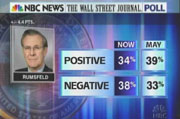 Williams: "And, Tim, I know you're releasing some new numbers tonight from our NBC News/Wall Street Journal poll on this very subject." Williams: "And, Tim, I know you're releasing some new numbers tonight from our NBC News/Wall Street Journal poll on this very subject."
Russert explained, with a matching graphic on screen of the poll results: "Absolutely, Brian. If you look at this, only about a third of the American people have a favorable opinion of Secretary Donald Rumsfeld -- 34 percent. And 38 percent have a disapproval or negative rating. Compare that to just a few months ago in May, and you see it was the exact opposite, 39 to 33. Those are extremely high negatives for a Cabinet secretary, particularly a Secretary of Defense. It is a war, Donald Rumsfeld is controversial, he does take no prisoners, and those numbers reflect it."
Actually, by going from 33 to 38 percent, Rumsfeld's negative rating moved up by just five percentage points and stands only four points higher than his positive rating -- which doesn't seem all that bad given his hostile media coverage.
# Coming Thursday: The Best Notable Quotables of 2004: The Seventeenth Annual Awards for the Year's Worst Reporting.
-- Brent Baker

Home | News Division
| Bozell Columns | CyberAlerts
Media Reality Check | Notable Quotables | Contact
the MRC | Subscribe
|



















 The awarding Tuesday of Presidential Medals of Freedom to Tommy Franks, Paul "Jerry" Bremer and George Tenet upset reporters on ABC and MSNBC. ABC's Peter Jennings teased World News Tonight by announcing that President Bush decided to honor "three men whose contribution to the war was controversial." Reporter John Cochran cited Bremer's "decision to remove Iraqis who served in Saddam Hussein's government" and how "that decision was reversed after the U.S. realized it needed their help." Cochran snidely noted: "No mention of that today." Cochran moved on to the "most controversial of the honorees," Tenet, who was "quoted as telling the President the case for weapons of mass destruction in Iraq was 'a slam dunk.' Today, no mention of that, either."
The awarding Tuesday of Presidential Medals of Freedom to Tommy Franks, Paul "Jerry" Bremer and George Tenet upset reporters on ABC and MSNBC. ABC's Peter Jennings teased World News Tonight by announcing that President Bush decided to honor "three men whose contribution to the war was controversial." Reporter John Cochran cited Bremer's "decision to remove Iraqis who served in Saddam Hussein's government" and how "that decision was reversed after the U.S. realized it needed their help." Cochran snidely noted: "No mention of that today." Cochran moved on to the "most controversial of the honorees," Tenet, who was "quoted as telling the President the case for weapons of mass destruction in Iraq was 'a slam dunk.' Today, no mention of that, either."  The audio was cut off at the start of Cochran's piece, which the MRC's Brad Wilmouth corrected against the closed-captioning:
The audio was cut off at the start of Cochran's piece, which the MRC's Brad Wilmouth corrected against the closed-captioning:  -- MSNBC's Hardball. Toward the end of a segment with Dana Priest, who appeared from the Washington Post newsroom, in the second half of the December 14 program, Chris Matthews blurted out: "I have to tell you, I'm waiting for a good response, Dana. I was aghast watching that medal of honor ceremony today. George Tenet, Bremer, Tommy Franks, it looked like the President was pinning a medal on the Iraq war, on himself -- for having fought the war. Why did these three guys deserve the medal of honor and why are they so obviously emblematic of the war, including the bad intel beforehand, the bad early work after the invasion itself that set itself for all the hell later. Tommy Franks, fine, he's a hero, he's a military guy. But what is this picture say to you of these three guys?"
-- MSNBC's Hardball. Toward the end of a segment with Dana Priest, who appeared from the Washington Post newsroom, in the second half of the December 14 program, Chris Matthews blurted out: "I have to tell you, I'm waiting for a good response, Dana. I was aghast watching that medal of honor ceremony today. George Tenet, Bremer, Tommy Franks, it looked like the President was pinning a medal on the Iraq war, on himself -- for having fought the war. Why did these three guys deserve the medal of honor and why are they so obviously emblematic of the war, including the bad intel beforehand, the bad early work after the invasion itself that set itself for all the hell later. Tommy Franks, fine, he's a hero, he's a military guy. But what is this picture say to you of these three guys?"  USA Today reporter Tom Squitieri argued: "Well, even in this cynical time, the level of cynicism of this one is reaching new proportions. It's being dubbed by some as 'hush medals.' You know, these guys still have to write their memoirs and their take on what happened in Iraq, in particular, and when you get a medal from the President, it makes you a little bit nicer about what you may or may not want to write. This medal helps to validate their time in Iraq and validates the White House decision to have those people in charge of the war in Iraq in the aftermath of the invasion. And so the coverage tomorrow, I think, will reflect that."
USA Today reporter Tom Squitieri argued: "Well, even in this cynical time, the level of cynicism of this one is reaching new proportions. It's being dubbed by some as 'hush medals.' You know, these guys still have to write their memoirs and their take on what happened in Iraq, in particular, and when you get a medal from the President, it makes you a little bit nicer about what you may or may not want to write. This medal helps to validate their time in Iraq and validates the White House decision to have those people in charge of the war in Iraq in the aftermath of the invasion. And so the coverage tomorrow, I think, will reflect that."
 Williams: "And, Tim, I know you're releasing some new numbers tonight from our NBC News/Wall Street Journal poll on this very subject."
Williams: "And, Tim, I know you're releasing some new numbers tonight from our NBC News/Wall Street Journal poll on this very subject."